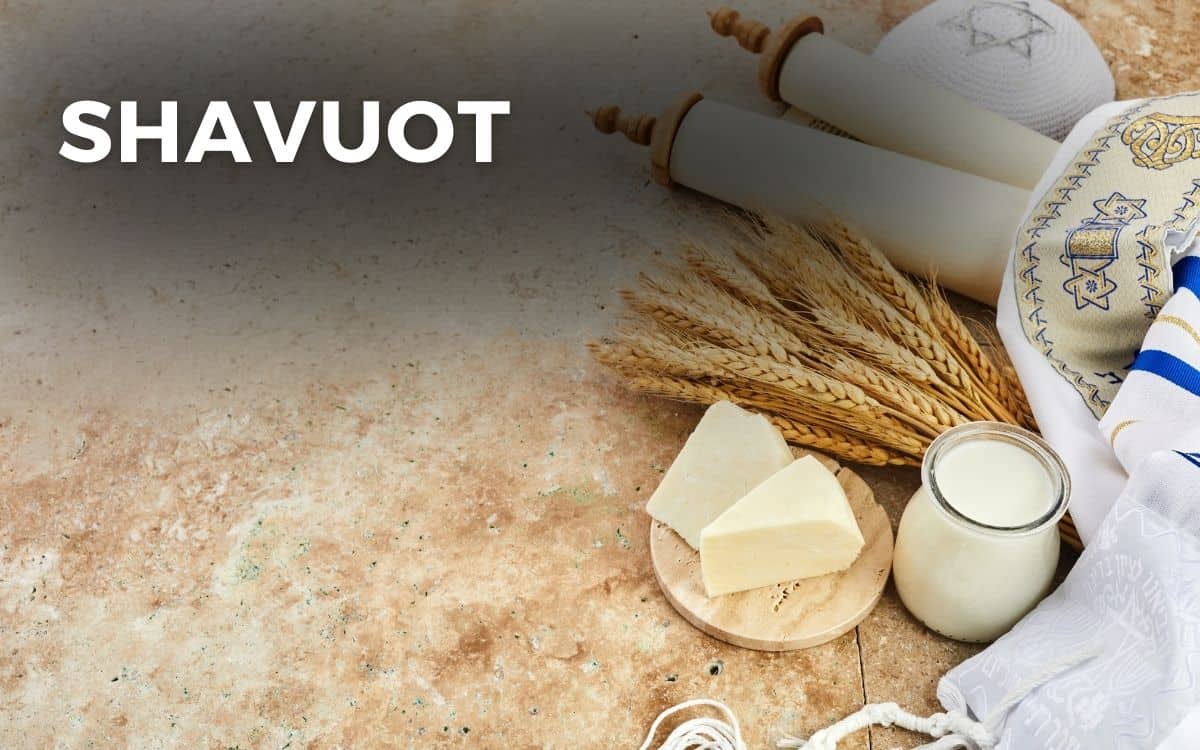Shavuot falls every year on the 6th of Sivan. June 12, 2024, marking a significant religious observance for the Jewish community. This holiday commemorates the giving of the Torah at Mount Sinai and is celebrated with traditions like studying religious texts and enjoying dairy foods. Understanding the significance of Shavuot can provide insights into Jewish history and culture, making it a valuable addition to your cultural awareness.

When is Shavuot?
Shavuot falls on June 12, 2024, a day filled with tradition and celebration for your business to embrace. This Jewish holiday, also known as the Feast of Weeks, marks the giving of the Torah at Mount Sinai. It’s a time for joyous festivities, delicious food, and meaningful reflections on the importance of community and faith in your business endeavors.
On Shavuot, you can engage with your customers in a unique and culturally rich way. Consider hosting special promotions or events that tie into the themes of gratitude and abundance associated with the holiday. You could offer exclusive discounts, organize a themed workshop, or even create Shavuot-inspired products to share with your customers.
History of Shavuot
Shavuot, also known as the Feast of Weeks, is a Jewish holiday with deep historical and cultural significance. Its origins lie in ancient agricultural practices and religious observances, making it one of the three pilgrimage festivals in Judaism, along with Passover and Sukkot.
Historically, Shavuot marked the end of the seven-week counting period (the Omer) that began on the second day of Passover. Originally an agricultural festival celebrating the wheat harvest, it later became associated with the giving of the Torah at Mount Sinai. According to Jewish tradition, it was on Shavuot that the Israelites received the Torah, the central text of Judaism, from God.
The transition from an agricultural festival to a commemoration of the giving of the Torah occurred over time, with the holiday taking on new layers of meaning and significance. This evolution highlights the interconnectedness of Jewish history, culture, and religion.
Key figures associated with Shavuot include Moses, who is believed to have received the Torah on Mount Sinai, and King David, who is traditionally said to have died on Shavuot.l.
How to Celebrate Shavuot
Ready to make your Shavuot celebration unforgettable? Discover ways for both individuals and businesses to honor this special holiday. From traditional customs to modern twists, there are endless possibilities to make this Shavuot one to remember.
How Individuals Can Celebrate Shavuot
Want to make this Shavuot special? You’re in for a treat! Get ready for five creative and engaging ways to celebrate this meaningful occasion. Let’s explore together!
- Host a Torah Study Marathon: Organize a day-long study session where participants delve into various texts and discussions related to Jewish tradition and spirituality.
- Create a Shavuot Recipe Exchange: Encourage friends and family to share their favorite dairy recipes, and compile them into a digital or physical recipe book to commemorate the holiday.
- Plant a “Torah Garden”: Grow plants and herbs mentioned in the Torah or associated with the land of Israel, such as figs, pomegranates, or olives, and use them to decorate your home or prepare dishes for the holiday.
- Organize a Community Service Project: Volunteer at a local food bank, organize a fundraiser for a charitable cause, or participate in environmental initiatives that reflect the values of social justice and tikkun olam (repairing the world).
- Host a Shavuot Film Festival: Screen movies or documentaries related to Jewish history, culture, or themes of revelation and spiritual awakening, followed by discussions and reflections on their significance.
How Businesses Can Celebrate Shavuot
Looking to infuse some holiday spirit into your business for Shavuot? Check out the upcoming points for five innovative ways to celebrate the holiday with your employees and customers. These strategies aim to engage your team, draw in new clientele, and sprinkle some festive cheer into your business operations.
- Create a Shavuot-themed Product Line: Develop special edition products or services inspired by Shavuot traditions, such as offering dairy-based treats, themed gift baskets, or exclusive deals on learning materials related to Jewish culture and spirituality.
- Host a Virtual Shavuot Celebration: Organize an online event for employees and customers, featuring interactive activities like cooking demonstrations, Torah study sessions, or live music performances. Offer discounts or promotions exclusive to participants.
- Support Local Dairy Farms: Partner with dairy suppliers or local farms to source ingredients for special Shavuot menu items or products, and highlight their contributions in marketing materials to promote community engagement and support.
- Implement a Learning Initiative: Launch a company-wide learning challenge focused on Jewish history, culture, or ethical values, with incentives for participation such as prizes, recognition, or charitable donations based on completion milestones.
- Offer Flexible Work Arrangements: Recognize the importance of Shavuot as a religious holiday by providing flexible scheduling options or allowing employees to take time off to observe the holiday. Encourage a culture of inclusivity and respect for diverse religious traditions within the workplace.
Social Media Post Ideas for Shavuot
Looking to spice up your social media feed for Shavuot? Explore creative post ideas for individuals and businesses to make your online presence buzz with festive spirit. From sharing traditional recipes to showcasing your business’s holiday promotions, there’s a world of opportunities to engage your audience and share the joy of Shavuot. Let’s brainstorm together and infuse your social media platforms with the vibrant essence of this special holiday!
Social Media Post Ideas for Individuals to Use on Shavuot
Looking to spice up your social media game this Shavuot? Here are five creative ways for you to engage with your followers and celebrate the holiday in style! Get ready to elevate your online presence with these fun and festive ideas. Let’s make this Shavuot one to remember with some exciting social media posts!
- Share Personal Reflections: Post about your own experiences and reflections on the significance of Shavuot, whether it’s memories of past celebrations, insights from Torah study, or thoughts on the holiday’s themes of revelation and renewal.
- Create Shavuot Recipe Videos: Share step-by-step cooking tutorials for traditional Shavuot dishes or innovative dairy recipes, accompanied by engaging visuals and captions highlighting the holiday’s culinary traditions.
- Host a Virtual Torah Study Session: Organize a live or pre-recorded Torah study session on platforms like Instagram Live or Facebook Watch, inviting followers to join in discussions on relevant texts and teachings.
- Highlight Community Events: Spread the word about local Shavuot events, such as synagogue services, study groups, or cultural festivals, by sharing event flyers, schedules, and registration information with your social media audience.
- Engage in Interactive Polls and Quizzes: Use features like Instagram polls, quizzes, or Q&A sessions to spark conversation and curiosity around Shavuot topics, such as trivia about the holiday’s history, customs, and symbolism.
Social Media Post Ideas for Businesses to Use on Shavuot
When it comes to celebrating Shavuot for your business, social media can be a powerful tool. Engage your audience with creative content ideas that showcase your brand’s connection to the holiday. Highlight special promotions, share behind-the-scenes glimpses, or run contests to generate buzz and connect with customers during this festive time.
- Host a Shavuot Giveaway: Launch a social media contest where followers can enter to win prizes related to Shavuot, such as gift baskets with dairy treats, exclusive merchandise, or discounts on relevant products or services.
- Feature Customer Testimonials: Share testimonials or user-generated content from satisfied customers who have used your products or services to celebrate Shavuot, highlighting their experiences and feedback.
- Offer Shavuot-themed Discounts: Promote special discounts or limited-time offers on your products or services specifically for Shavuot, using eye-catching graphics and engaging captions to attract attention and drive sales.
- Share Behind-the-Scenes Content: Give followers a glimpse behind the scenes of your business’s Shavuot preparations, whether it’s showcasing the creation process of special holiday products, introducing team members involved in planning, or sharing fun anecdotes and traditions from within the company.
- Create Interactive Polls or Quizzes: Use interactive features like polls, quizzes, or question stickers to engage your audience and spark conversations around Shavuot-related topics, such as favorite holiday traditions, food preferences, or cultural trivia.
Want to create social media content 10X faster? Start your free 7-day trial of the Social Media Content Club and say goodbye to social media stress.
Hashtags to Use During Shavuot
When creating social media posts for Shavuot, choosing the right hashtags can make a big difference in reaching your audience. Including popular and relevant hashtags can help increase engagement and visibility for your holiday-related content. Let’s explore some engaging hashtags to use during Shavuot to make the most out of your social media presence.
- #ShavuotCelebration
- #CheesecakeDelight
- #HarvestFestival
- #TenCommandments
- #DairyTreats
- #SpiritualJourney
- #GivingThanks
- #CommunityUnity
- #TraditionsAlive
- #FestivalofWeeks
For the complete list of holidays to celebrate on social media in June, visit AngieGensler.com/June-Holidays.
Other Holidays Related to Shavuot
Let’s explore some other holidays that are related to Shavuot. These holidays offer unique opportunities for celebration and reflection. Discover how these holidays can complement your Shavuot festivities and add richness to your cultural experiences.
- Passover (Pesach): Passover commemorates the Israelites’ liberation from slavery in ancient Egypt, marked by the Exodus story and the celebration of the Seder meal.
- Sukkot: Sukkot, also known as the Feast of Tabernacles, is a harvest festival celebrating the Israelites’ journey through the wilderness, observed by dwelling in temporary shelters called sukkahs.
- Yom Kippur: Yom Kippur, or the Day of Atonement, is the holiest day in the Jewish calendar, dedicated to fasting, prayer, and repentance, as individuals seek forgiveness for their sins.
- Rosh Hashanah: Rosh Hashanah, the Jewish New Year, marks the beginning of the High Holy Days and is a time for reflection, repentance, and renewal, as well as the sounding of the shofar.
- Hanukkah: Hanukkah, also known as the Festival of Lights, celebrates the rededication of the Second Temple in Jerusalem and the miracle of the oil lasting for eight days, commemorated by the lighting of the menorah.
For more holidays, download our free calendar with over 1,000 fun and unique holidays to celebrate this year. Head to angiegensler.com/holiday-calendar to grab your free copy.
Future Dates for Shavuot
Looking ahead, you’ll find it valuable to plan for future Shavuot celebrations. Understanding the upcoming dates for this holiday can help you prepare in advance. Let’s take a quick look at the future dates for Shavuot to make sure you’re always ready to mark this occasion.
| Year | Month | Day |
|---|---|---|
| 2024 | June 12th | Monday |
| 2025 | June 1st | Friday |
| 2026 | May 21st | Tuesday |
| 2027 | June 10th | Thursday |
| 2028 | May 29th | Monday |
| 2029 | June 17th | Sunday |
Frequently Asked Questions
Curious about Shavuot celebrations? Here are some common questions answered for you. Take a look at the FAQs below to get quick insights into this holiday.
What is the significance of Shavuot?
Shavuot commemorates the giving of the Torah to the Israelites at Mount Sinai and the culmination of the seven-week counting period (the Omer) that begins on the second day of Passover.
Why is dairy often consumed on Shavuot?
One explanation for the tradition of eating dairy foods on Shavuot is that it symbolizes the sweetness and richness of the Torah, often described as “milk and honey.” Another tradition suggests that after receiving the Torah, the Israelites needed to follow the dietary laws for the first time, leading them to eat dairy until they could properly prepare meat in accordance with the laws.
How is Shavuot celebrated in modern times?
Shavuot is celebrated with various customs and traditions, including reading the Book of Ruth, participating in Torah study sessions, attending synagogue services, and enjoying festive meals featuring dairy dishes. Additionally, some communities hold all-night study sessions known as Tikkun Leil Shavuot, reflecting the importance of learning and spiritual growth on this holiday.
Conclusion
In summary, Shavuot stands as a multifaceted holiday with deep historical roots and rich cultural significance. From its origins as an agricultural festival to its modern-day observance as a celebration of Torah and spiritual renewal, Shavuot serves as a reminder of the enduring values and traditions that unite Jewish communities worldwide. As we commemorate the giving of the Torah and the abundance of the land of Israel, let us embrace the spirit of learning, reflection, and community that defines this special day. Whether through engaging in Torah study, sharing festive meals with loved ones, or exploring the customs and traditions of Shavuot, may we all find meaning and inspiration in the celebration of this timeless holiday.
Celebrate this special day with us, and don’t forget to download our free holiday calendar for more fun and unique holidays to celebrate this year.















